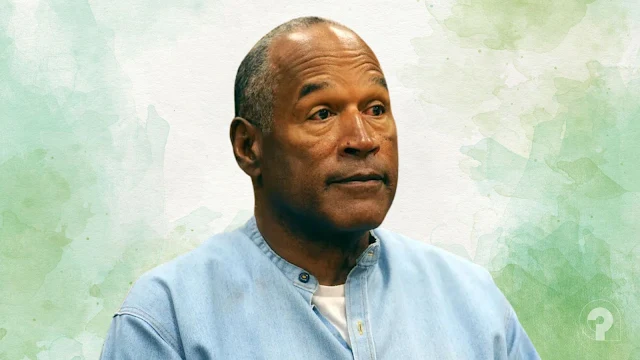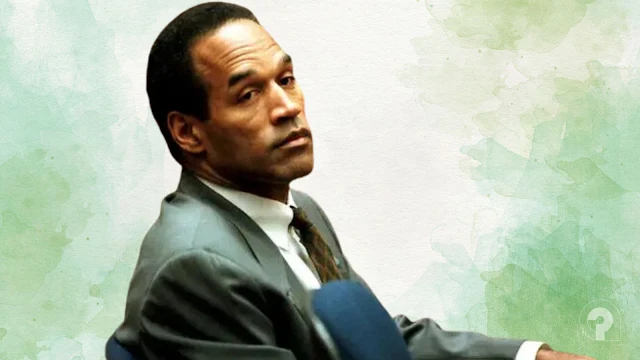Orenthal James Simpson, known as O.J. Simpson, was an American football player, broadcaster, and actor. Born on July 9, 1947, he became one of the greatest running backs in the history of the National Football League (NFL), primarily playing for the Buffalo Bills. His remarkable sports career included being the first NFL player to rush for more than 2,000 yards in a season, a feat he achieved in 1973 during a 14-game regular season, which remains a record for the single-season yards-per-game average at 143.1.

Simpson's legacy extends beyond his athletic prowess. He also had a career in acting and broadcasting following his retirement from professional football. However, his life took a dramatic turn when he was tried and controversially acquitted for the murders of his former wife, Nicole Brown Simpson, and her friend Ronald Goldman in 1994. The trial, held in Los Angeles County Superior Court starting in 1994, was one of the most publicized criminal trials in American history.
Despite his acquittal, the trial's notoriety had a lasting impact on Simpson's public image and legacy. The case has been the subject of numerous books, films, and television series, reflecting its enduring fascination and complexity.
O.J. Simpson passed away on April 10, 2024, after a storied NFL career and a life that was as tumultuous off the field as it was successful on it. His death marked the end of a life that had been scrutinized in the public eye for decades, leaving behind a complicated legacy that combines outstanding athletic achievement with a highly controversial legal history.
O.J. Simpson trial
The O.J. Simpson trial, officially titled The People of the State of California v. Orenthal James Simpson, was a pivotal moment in American legal history, capturing the attention of millions worldwide. The trial began on January 24, 1995, and concluded on October 3, 1995, with the acquittal of O.J. Simpson for the murders of Nicole Brown Simpson and Ronald Goldman.
The case was prosecuted by the Los Angeles District Attorney's office, with Marcia Clark and Christopher Darden leading the charge. Simpson's defense team, dubbed the "Dream Team," included prominent lawyers such as Robert Shapiro, Johnnie Cochran, F. Lee Bailey, Alan Dershowitz, and Robert Kardashian.
The trial was heavily publicized, partly due to Simpson's fame as a former NFL star and actor, but also because of the racial tensions and the LAPD's history of alleged misconduct, which the defense used to their advantage. The prosecution presented a substantial amount of forensic evidence, including DNA evidence, which was a relatively new field at the time. However, the defense argued that the evidence had been mishandled and that Simpson had been framed by a racist police force, particularly pointing to Detective Mark Fuhrman.
One of the most memorable moments of the trial was when Simpson tried on a pair of gloves alleged to have been used during the murders; the gloves appeared to be too tight, leading to Cochran's famous line, "If it doesn't fit, you must acquit." This moment, among others, played a significant role in the jury's not guilty verdict.
The trial's outcome was controversial and led to widespread debate about the U.S. justice system, race relations, and celebrity culture. The case has since been the subject of numerous books, documentaries, and a critically acclaimed television series, demonstrating its lasting impact on society and popular culture.
The O.J. Simpson trial remains a topic of fascination and study, symbolizing a moment when legal proceedings became a national spectacle and left an indelible mark on the American consciousness.

What was the aftermath of the trial?
The aftermath of the O.J. Simpson trial was as significant and multifaceted as the trial itself, leaving a lasting impact on American society, culture, and the legal system. The trial's conclusion did not mark the end of the saga; instead, it opened a new chapter of consequences and reflections that continue to resonate today.
Legal and Civil Proceedings
Following the criminal trial, in 1997, a civil court found O.J. Simpson liable for the wrongful deaths of Nicole Brown Simpson and Ronald Goldman, awarding their families $33.5 million in compensatory and punitive damages. This verdict contrasted sharply with the criminal trial's outcome, highlighting the different burdens of proof required in criminal versus civil cases.
Public Perception and Media Landscape
The trial's extensive media coverage and the public's voracious appetite for every development set a precedent for how the media covers high-profile cases. It was a harbinger for the 24-hour news cycle and the rise of court TV, which brought legal proceedings into living rooms across the country. The case also sparked discussions about the intersection of race, celebrity, and justice in America.
Impact on the Legal Profession
The trial had a profound effect on the legal profession, influencing how attorneys approach high-profile cases, jury selection, and the presentation of forensic evidence. It also underscored the importance of narrative and character framing in trials, as seen in the defense's successful portrayal of Simpson and the LAPD.
Cultural Influence
The O.J. Simpson trial has been the subject of numerous books, films, documentaries, and television series, reflecting its deep penetration into the cultural fabric. The FX series "The People v. O.J. Simpson: American Crime Story" is one such example, winning critical acclaim and reigniting public interest in the case.
Personal Lives of Key Figures
The lives of the trial's key figures, including the lawyers and Simpson himself, were forever changed. Some, like Johnnie Cochran, used the trial's success to bolster their careers, while others, like Marcia Clark, faced intense scrutiny and criticism. Simpson's life post-trial was marked by legal and financial troubles, culminating in his 2008 conviction for armed robbery and kidnapping, for which he served nine years in prison.
Societal Reflections
The trial prompted Americans to reflect on broader societal issues, such as the reliability of the criminal justice system, the role of race in legal outcomes, and the influence of wealth and status on the pursuit of justice. These conversations have continued to evolve, with the trial serving as a reference point for ongoing debates about equality and fairness in the legal system.
The O.J. Simpson trial's aftermath extended well beyond the courtroom, influencing legal practices, media coverage, cultural discourse, and societal reflections on justice. Its legacy is a tapestry woven from the threads of law, media, and culture, reflecting the complexities of the American experience. The trial remains a touchstone for discussions about the law and its intersection with race, celebrity, and media in the United States.
How did the families of Nicole Brown Simpson and Ronald Goldman react to the verdict?
The media coverage of the families' reactions to the O.J. Simpson verdict was extensive and emotive, reflecting the nation's captivation with the trial and its outcome. When the jury announced the not guilty verdict, cameras immediately turned to the families of Nicole Brown Simpson and Ronald Goldman for their responses. The media portrayed their reactions as a mix of shock, grief, and disbelief, capturing a poignant moment in American legal history.
The Goldman family, particularly, was very vocal about their disappointment with the verdict. Fred Goldman, Ronald Goldman's father, was often seen expressing his family's sense of injustice and loss in interviews and press conferences. The Brown family, while less public in their immediate response, also conveyed their heartache and disbelief through various media outlets.
In the days and weeks that followed, the media continued to focus on the families, documenting their journey through the aftermath of the trial. Television interviews, newspaper articles, and magazine features delved into their personal stories, exploring the impact of the trial and its verdict on their lives.
The civil trial that ensued, which found Simpson liable for the wrongful deaths of Nicole and Ronald, was also widely covered. The media reported on the families' pursuit of justice and the eventual financial settlement, which was seen as a form of vindication for them, albeit not a substitute for criminal conviction.
The media's role in shaping public perception of the trial and its aftermath cannot be understated. Through their coverage, they highlighted the complexities of the legal system, the nuances of the case, and the human element at the heart of the tragedy. The families' reactions, as portrayed by the media, became a symbol of the trial's broader societal implications, touching on themes of justice, celebrity, and the American legal process.
